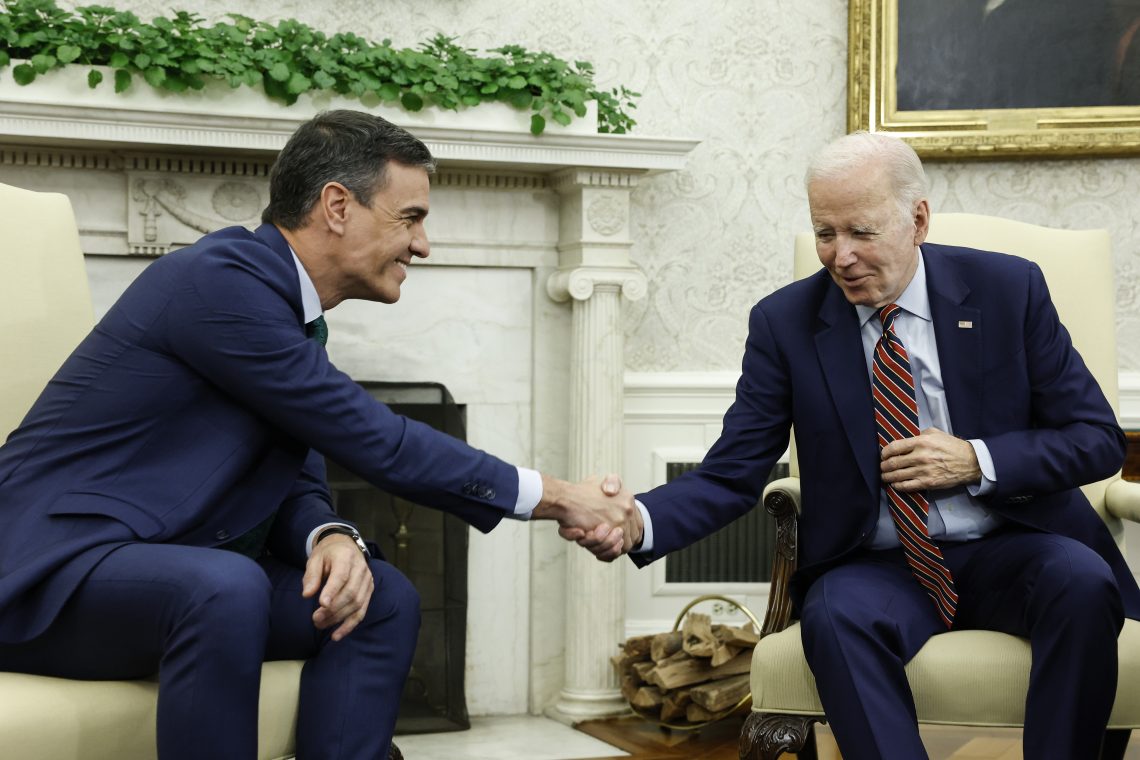Prospects strong for harmonious U.S.-Spanish relations
The bilateral relationship is deep and nonpartisan, with generally common interests in security and trade, bringing continuity no matter who is in power in either country.

In a nutshell
- The United States is typically a top source of foreign direct investment in Spain
- Madrid pledges boost in defense spending to the NATO standard of 2 percent of GDP
- U.S. policymakers are willing to work with either socialists or conservatives
There is no likely scenario where bilateral cooperation between Madrid and Washington is seriously challenged. That said, in the years ahead, the character of the governments in the two capitals could establish very different conditions for cooperation, leading to relationships that will range from formal and correct, at a minimum, to trusting and proactive. Both countries have divided electorates with different visions for the future of the transatlantic community. Who controls the capitals in future years will define the next phase of the relationship.
How Spain and the U.S. help each other and why it matters
NATO membership remains foundational to the bilateral partnership. Spain hosts two important U.S. bases, Moron Air Base and Naval Station Rota. They assist the U.S. not only in NATO but also the projection of American military power into the Mediterranean, the Middle East and Africa. In addition, Spain and the U.S. generally share common priorities, including support for Ukraine and NATO enlargement. Both, for instance, recently supported adding Finland and Sweden to the alliance. In 2022, the Spanish government vowed to reach 2 percent of gross domestic product (GDP) spending on defense, but so far, it is falling short, with estimated spending of less than 1.3 percent of GDP in 2023.
Furthermore, despite a public row that erupted when a member of the Spanish cabinet accused Israel of genocide, the Spanish government officially shares the U.S. policy of strongly supporting Israel during the conflict in Gaza.
Read more by James Jay Carafano
U.S.-Latin American interests in freefall
War in Israel casts doubt on U.S. Middle East policy
U.S.-Africa policy adrift
The U.S. is typically a top source of foreign direct investment in Spain, which has 47 million people. Together, the U.S. and Europe dwarf the influence of China in helping to power an economy that World Economics estimates will have had a gross domestic product of $1.9 trillion in 2023, based on purchasing power parity. While publicly open to engaging with China, Madrid prioritizes its relationship with the West.
Spain also holds sway in the Ibero-Atlantic world. When the U.S. and Spain work together, they carry greater diplomatic weight in relations with Latin America and North Africa. As the West competes for greater leverage in the Global South, this partnership could be a strategic advantage for both nations. The bilateral relationship is comprehensive. Both the U.S. and Spain play pivotal roles in the “culture wars” raging across the U.S., Canada, Latin America and Europe on issues from family policy to religion, education and gender. Both are caught in the tug-of-war between traditionalists and progressives on such matters as climate change, diversity and historical responsibility for colonialism and imperialism.
How government changes might affect the relationship
There is currently strong geopolitical alignment between the U.S. administration led by President Joe Biden and Spanish Prime Minister Pedro Sanchez, a socialist who has been in power since 2018. This commitment was reaffirmed after Mr. Biden visited Spain on June 26-28, 2022, in a joint declaration, which stated: “Spain and the United States are committed to defending the rules-based international order, which has been the foundation for preserving our security and advancing our prosperity over the past seven decades.” Mr. Sanchez last visited the White House in May 2023.
But there is a real question over how long the prime minister will remain in power. He eked out a parliamentary majority by garnering the votes of the Catalan separatist Junts (Together) party after promising a national amnesty bill for those involved in the illegal 2017 independence referendum. The proposal has proved highly controversial, triggering weeks of widespread public protests.
The dispute over the legality and viability of the amnesty bill has made for a rocky start for the new governing coalition, agreed in October 2023 with the hard-left Sumar party, and it has already been labeled the “Frankenstein Government” because of the many political compromises required to achieve a parliamentary majority. There is a question of whether the government can endure. The coalition could well collapse, necessitating new national elections. If a conservative Spanish government emerges in the near term, this could create friction with President Biden’s administration.
For instance, the Spanish government has been directly supportive of the Sao Paulo Forum, described by Heritage Foundation senior fellow Michael Gonzalez as “the world’s largest and most impactful Marxist international organization … pro-China and pro-Russia.” The forum includes several leading leftist leaders in Latin America, including the heads of the Cuban, Bolivian, Colombian, Brazilian and Mexican governments. The Biden administration has been extraordinarily tolerant of the forum leaders, even though their policies appear often antithetical to U.S. interests. At their conference last summer, Mr. Gonzalez noted, speakers “routinely lambasted the United States and defended and praised China, Russia, Cuba and Venezuela.”
The Biden administration, however, looks at the forum more as a “debating society” than a geopolitical challenge. A conservative Spanish government, on the other hand, would immediately distance itself from the forum and Latin American socialists, putting the U.S. and Spain on different agendas in engaging the Ibero-Atlantic region.
A conservative Spanish government is also likely to take a more skeptical view of the climate-change agenda, placing more emphasis on delivering reliable, affordable and abundant energy than focusing on net-zero emissions outcomes.
While a conservative government might not be energized enough to take a lead in the culture wars, it is without question likely to be more socially conservative and less interested in Mr. Biden’s progressive global agenda.
Furthermore, a conservative Spanish government is likely to take a harder line on China, aligning with the U.S. and Europe, rather than floating the idea of Spain and Europe as an “alternative” to China or America.

Scenarios
The Biden administration and a conservative Spanish government are likely to get along. After all, the Biden team has maintained very constructive relations with the conservative Italian government, which a conservative Spanish government might closely resemble.
In a contrasting scenario, if Prime Minister Sanchez keeps his coalition together and Republicans take over the White House in January 2025, the conditions would be virtually reversed with a new conservative administration in Washington much less interested in climate change orthodoxy and tolerating leftists in Latin America. These views would contrast with the current Spanish government.
However, there will also be elements of continuity regardless of who holds office in Madrid and Washington in the next few years. One is that there will be clear continuity in support for NATO. There will also be efforts by both governments to find common ground on relations with China, Latin America and North Africa.
Any mix of conservative and liberal governments in the two capitals is possible and not improbable. Even if the politics of the two do not perfectly align, there is little likelihood that the bilateral partnership will be at risk. On the other hand, if the politics of the two governments do match up, there will be much less geopolitical friction and greater opportunity and interest in advancing common agendas.
For industry-specific scenarios and bespoke geopolitical intelligence, contact us and we will provide you with more information about our advisory services.








